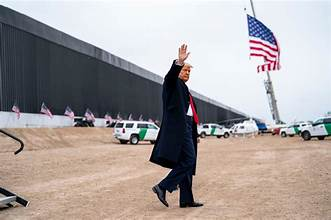In recent months, Donald Trump’s immigration stance has taken a sharper turn as he ramps up his campaign for the 2024 U.S. presidential election. His latest policies and statements focus heavily on tightening immigration rules — but this time, the impact is being felt beyond border control. Many international investors, particularly foreign homebuyers, are now facing difficulties buying property in the United States.

This emerging issue has raised concerns in the real estate industry, as Trump’s strong immigration push may unintentionally hurt a part of the housing market that has long depended on global buyers.
Foreigners Once Boosted the Housing Market — Now They Feel Unwelcome
Historically, foreign buyers have been a strong part of the U.S. housing economy. According to the National Association of Realtors (NAR), international buyers spent nearly $59 billion on U.S. residential properties between April 2021 and March 2022.
Buyers from countries like China, Canada, Mexico, India, and the United Kingdom have invested in homes across cities such as New York, Los Angeles, Miami, and Houston — not only as residences but also as investment assets. These purchases supported local markets, especially in states with high property prices.
But with Trump’s calls for stricter immigration rules, including increased visa restrictions, extended background checks, and even targeted bans for specific countries, these buyers are getting nervous.
Visas, Delays, and Rising Anxiety
Foreigners who wish to buy property in the U.S. often need long-term visas to stay in the country and manage their investments. But Trump’s proposed changes are making these visas harder to get or extend.
The EB-5 visa, for instance — which offers a green card in exchange for investing in U.S. businesses — has become less appealing. New restrictions and longer processing times under the Trump-era and post-Trump immigration policies have made this once-attractive route uncertain.
A similar issue exists with the B-1/B-2 tourist visas, commonly used by short-term foreign buyers visiting to purchase or inspect homes. With increased scrutiny, applicants are facing delays or rejections.
Real estate agents have noticed the shift. “Earlier, we had regular interest from foreign buyers, especially from Asia and the Middle East. But since the Trump immigration talk started again, many of them are backing out or putting their plans on hold,” said Jessica Liu, a luxury realtor based in California.
State-Level Measures Add More Pressure
Some states are also joining the movement, proposing or passing laws that limit foreign ownership of land and homes.
For example, Florida recently passed a law that bans citizens from China, Iran, North Korea, and a few other countries from buying property near military bases or key infrastructure. This has already caused confusion and legal challenges, with many foreign buyers unsure if their deals will go through.
While these laws are framed as national security measures, critics argue they promote discrimination and create unnecessary barriers for law-abiding investors.
Fear of a Broader Chill on International Investment
Real estate experts warn that if this trend continues, the U.S. could lose billions in foreign investment. Not only could this reduce property prices in luxury and coastal markets, but it may also send a negative message that the U.S. is closing its doors to global business.
“Foreign money has helped stabilize and grow parts of our housing market. Turning that away could backfire, especially when interest rates and inflation are already a concern,” said James Becker, an economist with Zillow.
The timing couldn’t be worse. With mortgage rates still high and many Americans unable to afford homes, the absence of international buyers could create longer inventory cycles, especially for high-end properties.
What This Means for the Average American Homeowner
At first glance, fewer foreign buyers might sound good for U.S. citizens — more homes available and possibly lower prices. But the reality is more complex.

International buyers often purchase high-end or second homes, which means they don’t usually compete with middle-class American families. Their money helps developers build new projects and keeps real estate agents, construction workers, and lenders employed.
Without that extra cash flowing in, the entire system could slow down, affecting job growth and housing supply over time.
Looking Ahead: Will Policies Tighten Even More?
As the election approaches, Trump and other candidates may further promote strong immigration measures to appeal to voters concerned about border issues. However, if these moves extend to real estate and investment, the U.S. may risk losing its long-standing reputation as a safe and stable market for global investors.
Experts recommend monitoring visa rule changes, state-level real estate restrictions, and any federal legislation affecting foreign investments. Real estate agents also advise foreign buyers to consult legal experts before committing to any U.S. property deals.
Conclusion
Trump’s renewed push for strict immigration policies may be aimed at national security and voter appeal, but it is also creating a ripple effect in areas not typically associated with immigration — like real estate.
As more foreigners find it harder to purchase homes in the U.S., the housing market could feel the pressure, especially in regions that have traditionally thrived on international investment.
links for Further Reading:
- National Association of Realtors: Foreign Buyer Statistics
- Florida’s Foreign Ownership Law Details
- Zillow Housing Market Trends
Also Read – How the United States Is Fighting Hidden Attacks on Tech Power






